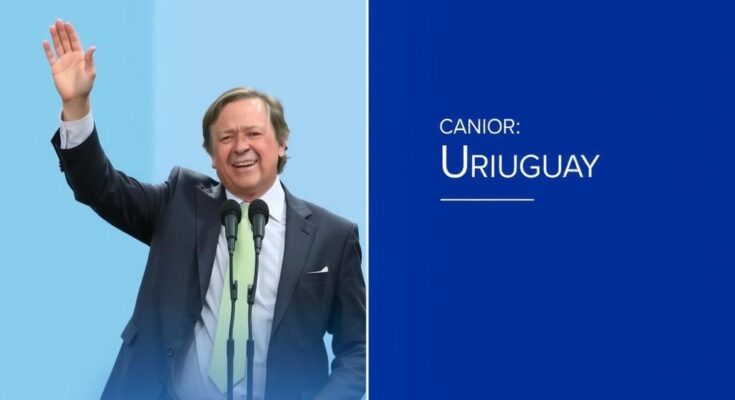Álvaro Delgado, the conservative presidential candidate in Uruguay, conceded defeat to left-wing challenger Yamandú Orsi in a tight runoff election. Orsi, who won with 49.56% of the vote, emphasized unity and moderation in his victory speech, addressing voter concerns over economic challenges. The election marks a return to leftist governance in Uruguay following dissatisfaction with the incumbent government’s handling of the economy and crime.
In a closely contested runoff election, Álvaro Delgado, the presidential candidate of Uruguay’s ruling conservative coalition, conceded defeat to left-wing challenger Yamandú Orsi. Celebrating his victory, Orsi, a former history teacher and two-time mayor from the Broad Front coalition, expressed his commitment to unite the nation post-election. With approximately 91% of votes counted, Orsi garnered 49.56% against Delgado’s 46.17%, amidst a significant voter turnout of nearly 90%. This election marks a shift in Uruguay’s political landscape as voters expressed discontent over economic challenges like stagnant wages and rising crime.
Orsi’s campaign focused on a moderate agenda, avoiding radical changes while promoting social security reforms and tax incentives to attract investments. His platform aligns closely with that of the Broad Front, which previously governed the country, making gains in social issues such as abortion rights and same-sex marriage. Former President José Mujica, a key figure in advancing these reforms, showed his support for Orsi on Election Day.
Despite promising a return to pro-business policies, Delgado’s party faced backlash from citizens frustrated with prolonged economic difficulties. This election outcome is part of a broader trend observed globally where anti-incumbent sentiments are reshaping political landscapes across various democracies. Turnout was notably high, reflecting the civic engagement among Uruguayans to influence their governance.
In his victory address, Orsi articulated a desire for national dialogue and integration, signaling a proactive approach in his future presidency, aimed at addressing the concerns of a divided electorate.
Former President Lacalle Pou publicly congratulated Orsi on his election and has committed to facilitating a smooth transition. As Uruguay moves forward under Orsi’s leadership, the prospects for addressing the nation’s socio-economic challenges remain a priority for the newly elected administration.
The election in Uruguay reflects a significant political transition with the defeat of the incumbent conservative coalition after a five-year tenure. The voter sentiments were largely influenced by the economic issues that the country has faced in recent years, similar to trends observed in other countries where ruling parties have faced electoral backlash. Orsi’s approach, marking a return to leftist governance, seeks to balance progressive social reforms with economic strategies to invigorate growth and tackle social inequalities. Uruguay is known for its progressive policies, particularly under previous administrations of the Broad Front, which greatly shaped its modern social policies. The political landscape in Uruguay remains dynamic, demonstrating a keen responsiveness to public discontent and a desire for effective governance that resonates with the electorate’s needs.
In conclusion, the electoral victory of Yamandú Orsi represents a pivotal moment in Uruguay’s political trajectory, as the nation shifts away from a conservative leadership that experienced significant economic frustrations to a left-leaning administration promising unity and moderate reforms. This election is notable not only for its implications domestically but also reflects a widespread trend of voters seeking change in the global political arena. With high voter engagement and focused policies aimed at addressing key issues, Orsi’s leadership is poised to influence the future of Uruguay significantly.
Original Source: www.coastreporter.net




